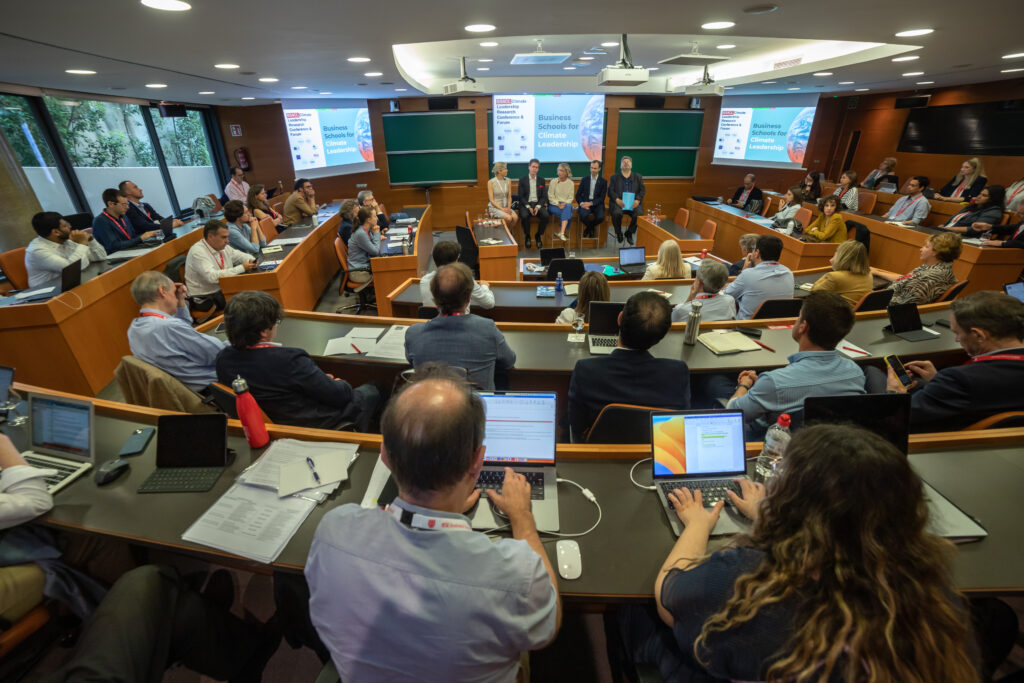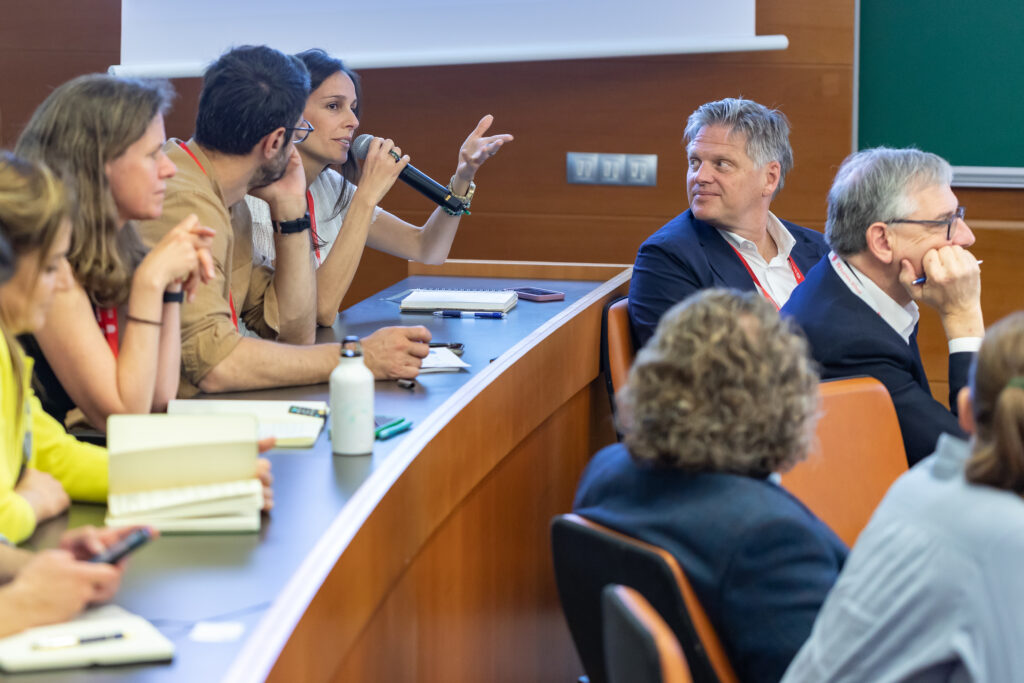In the fight against climate change, business schools are in a unique position to fill the knowledge and skills gap that many companies and their leaders are experiencing in the drive to become more sustainable.
That was one of the main conclusions of a conference of eight leading European schools which together comprise the Business Schools for Climate Leadership (BS4CL) initiative. BS4CL members and business leaders met June 1-2, 2023, on IESE’s Barcelona campus for their first in-person event since the group’s creation in 2021.
The alliance is made up of Cambridge Judge Business School, HEC Paris, IE Business School, IESE Business School, INSEAD, International Institute for Management Development (IMD), London Business School (LBS) and Saïd Business School at the University of Oxford.
The schools agreed that there is growing demand from businesses and their leaders for knowledge and skills on sustainability-related issues. Business schools, with their rigor and depth, are well placed to provide that content and training. To get there, collaboration and speed are of the essence.
“Our alumni actually are asking us ‘What are you doing (in sustainability)? I would like to learn more about how to be an effective leader in the context of sustainability,’” said IESE Dean Franz Heukamp. “People for the first time actively realize that they need to learn.”
In addition to generating more content on sustainability, schools must stay true to the core management teachings that prepare students to lead in a changing world, whatever the challenge may be. “Our programs are designed to prepare individuals for the world in which they live,” said Jean-François Manzoni, president of IMD.
There is strength in numbers, which BS4CL must exploit. While each of the universities is outstanding on its own, together the institutions offer the potential for research collaboration across industries, disciplines, and borders. They can also mobilize their alumni, which collectively number 500,000 people.
“A lot of our power is in the platform we create and how we help people to connect,” said François Ortalo-Magné, dean of London Business School.
The BS4CL conference was composed of two parts: the June 1 BS4CL Climate Leadership Research Conference, which showcased new evidence-based ideas on climate change from the eight universities, and the BS4CL Forum: Leading Decarbonization, which brought academics and business leaders together, on June 2.
Subtitle 1: Business leaders seek knowledge, training
Business leaders echoed the need for knowledge and skills, while stressing the imperative for action. Stakeholders are demanding greener business models, and there’s growing evidence that sustainability makes not only ethical but also business sense.
No employee should remain on the sidelines of sustainability. It must start at the top and permeate the organization in what Ester Baiget, president & CEO of biotech company Novozymes, calls a “full ecosystem” of support. “You need a board that supports the CEO. If you don’t have that support it’s impossible,” she said. Sonia Tatar, board member of Chapter Zero France agreed: “The role of the board is to set the tone from the top.”
That must trickle down. Companies that want to be considered responsible externally must believe in it internally, said Andrea Baldo, CEO of Danish fashion brand Ganni. “It’s about how you nurture this culture internally,” he said.
Another issue raised in the conference was the need for standards for reporting and disclosure. Richard Barker, a board member of the International Sustainability Standards Board (ISSB), said the long-standing practice of voluntary reporting on ESG issues is likely to change, especially in Europe, to be more mandatory and standardized.
This will require a radically different approach to reporting, since it incorporates non-monetary metrics and the entire value chain, not just internal operations. It contemplates a company’s activities over the past year but also what it will do going forward. New skills, accounting and otherwise, are needed. “There’s a massive gap between what the world needs to know and what the world needs to do and where we are now,” Barker said.
Business schools may contribute at different levels. Their graduates can bring in the skillsets needed – from general competencies such as the ability to collaborate, to more specific knowledge such as green accounting standards and best practices. Professors bring expertise and perspective to bear. While companies tend to have a narrow view of their own operations, and perhaps some of their competitors, academics can take a view that is both broader and deeper on what it means to be a sustainable leader and company.

Subtitle 2: Multidisciplinary research focus – June 1
The first day focused on the research, featuring 11 papers, many by early-career researchers, with all eight schools represented. Since climate change is such a multidimensional problem, the research projects were multidisciplinary and featured both quantitative and qualitative research. The project presented were:
- Karl Schmedders (IMD), Asset Pricing with Disagreement about Climate Risks, which looks at how markets are pricing risks associated with climate change.
- Jingyu Zhang (Queen’s University Canada), Jingshu Wen (Cambridge Judge Business School), Common Ownership and Corporate Carbon Emissions, which finds that the presence of institutional investors across industries is associated with higher carbon emissions.
- Robert Raney (IESE), Gaizka Ormazabal (IESE), Donald N’Gatta (MDE Business School), Trading of Emission Allowances and Financial Frictions, which finds that [DM1] companies on emission trading systems are selling their carbon allowances in response to liquidity needs and reporting incentives.
- Milind Goel (LBS), Do Homeowners Care About Sustainability?, a study of home sales in the UK, which finds that buyers value sustainability issues such as energy efficiency when acquiring a home.
- Julian Marenz (LBS), Marcel Olbert (LBS), Diego R. Kanzig (NU), The Effects of Taxing Carbon Emissions on Carbon Leakage to Developing Countries, which examines how the introduction of stricter climate policies in Europe prompted multinationals to relocate some activities to Africa, increasing emissions there.
- Âriel de Fauconberg (CJBS), The Power (and Stigma) of Oil: Strategic Identity Positioning and Innovation in the Energy Sector, a qualitative study of how oil company employees responsible for innovation processes respond to stakeholder opposition while pursuing net zero.
- Carlos X. Lastra-Anadón (IE), Doing it for the Firms? National Advantage and Climate Change Regulation, which highlights the influence of incumbent firms, sometimes at the expense of public interest, in shaping climate policy-setting.
- Clara Carrera (INSEAD), Serasu Duran (UCalgary), Atalay Atasu (INSEAD), Luk Van Wassenhove (INSEAD), Urban Mining, Scarcity, and the Energy Transition, which explores the potential mismatch between the minerals needed for the low-carbon economy and their availability.
- Lucrezia Nava (Cambridge Judge Business School), David Reiner (Cambridge Judge Business School), Science or Morality? The Effects of Frames on Stakeholder Dialogue, a Field Experiment, which asks whether science-based or emotional frameworks are more effective in encouraging dialogue among stakeholders.
- Augustin Landier (HEC Paris), Bruno Biais (HEC Paris), Emission Caps and Investment in Green Technologies . Using the case of CO2 emission caps, examines what firms do to adapt to expectations of future regulations, and what government actions are finally.
- Ho-Wei (Alison) Hsu (HEC Paris), Wenru Shi (HEC Paris), Hatching an Industry: The Incubation and Growth of the Direct Air Capture Industry Studying the direct air capture (DAC) industry, explores how industries with mission-oriented technologies go from incubation to growth, once commercial uncertainties were reduced.

Subtitle 3: Business leaders and academics – June 2
The second day brought together academics and business leaders. It featured a panel of three deans from the participating universities. Speakers and moderators were:
- Ester Baiget, President & CEO, Novozymes
- Andrea Baldo, CEO, GANNI
- Richard Barker, Board Member, International Sustainability Standards Board (ISSB)
- Jose Luis Blasco, Global Sustainability Director, Acciona
- Fabrizio Ferraro, Professor and Department Chair of Strategic Management, Sustainable Leadership Initiative Academic Director, IESE Business School
- Concepción Galdón, Director of IE Center for Social Innovation and Sustainability, Lead of IE Sustainable Impact Teaching and Research
- Knut Haanaes, Professor of Strategy and Lundin Chair Professor of Sustainability, IMD
- Franz Heukamp, Dean, IESE Business School
- Jennifer Howard-Grenville, Professor of Organisation Studies, Cambridge Judge Business School
- Ioannis Ioannou, Associate Professor of Strategy and Entrepreneurship, London Business School
- Katell Le Goulven, Executive Director, Hoffman Institute for Business & Society, INSEAD
- Charmian Love, Global Director of Advocacy, Natura & Co
- Jean-François Manzoni, President, IMD
- Tiago Martinho, Executive Director, Wheeler Institute, London Business School
- Natalia Olynec, Chief Sustainability Officer, IMD
- François Ortalo-Magné, Dean, London Business School
- Juliane Reinecke, Professor of Management Studies, Said Business School at Oxford University
- Marie-Pierre Seyfried, Project Director, Climate & Earth Center, HEC Paris
- Sonia Tatar, Board Member, Chapter Zero France; Executive Director, INSEAD Corporate Governance Centre
- Pierre-Francois Thaler, Co-CEO, Ecovadis
- Peter Tufano, Baker Foundation Professor, Senior Advisor to the Salata Institute for Climate and Sustainability, Harvard Business School
